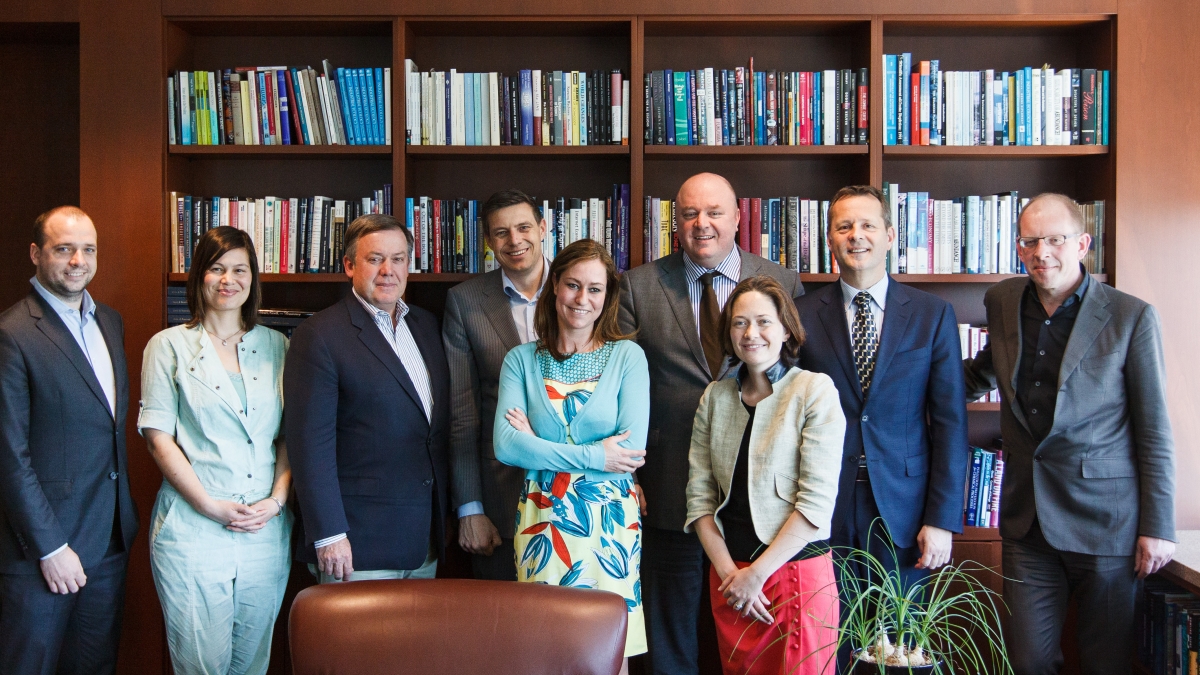Dutch delegation visits ASU to strengthen partnerships for a more sustainable world

Community and business leaders from Haarlemmermeer, a municipality bordering Amsterdam in the Netherlands, recently visited Arizona State University as part of the municipality’s partnership with ASU’s Global Institute of Sustainability (GIOS).
Haarlemmermeer, home to Amsterdam’s Schipol International Airport, is the first Global Sustainability Solutions Center (GSSC) to be established under GIOS’ Walton Sustainability Solutions Initiatives.
The partnership was launched Jan. 22 to serve as a platform for ASU to research, implement and collaborate on sustainability solutions throughout the region and across Europe using the expertise of its faculty and students.
The long-term goal is to support the municipality’s ambition to become one of the most sustainable sites for businesses, community organizations, individuals and visitors in the Netherlands.
"The GIOS-Haarlemmermeer partnership represents the future of sustainability – a future that is based on integrating thorough, outcome-based research with sound policy decisions,” said ASU President Michael Crow. "As we move forward and make progress, we want to leave behind a legacy of personal, political and business decisions that took into consideration their impact on the environment. The collaboration supports Haarlemmermeer’s efforts to become a sustainability leader in the Netherlands and provides ASU students and faculty opportunities to address real sustainability challenges from a global perspective.”
Rob Melnick, executive director and CEO of GIOS, said the partnership enables Haarlemmermeer and ASU experts to build a solutions-oriented urban environment from the ground up.
“The municipality of Haarlemmermeer is new and still growing,” Melnick said. “They are planning for a future that places high priority on sustainability. We’re excited to be a part of that process.”
The Dutch delegation was comprised of aldermen Arthur van Dijk and John Nederstigt, sustainability programs manager Debby de Rijk, and higher education programs manager Wendy van Vliet from the municipality of Haarlemmermeer, Delta Development Group CEO Coert Zachariasse, Schiphol Area Development Company Project Director Dick van der Harst, Monique Hallegraeff and Guus Daanen from the Catholic Comprehensive School in Hoofddorp, and Fonz Dekkers, site coordinator for the Walton Initiatives’ Global Sustainability Solutions Center.
During the visit, Dekkers presented a case study in monitoring sustainable urban development, while aldermen Nederstigt and van Dijk discussed how the region is becoming the Dutch pioneer in sustainable innovation and economic development.
The delegates also met with ASU’s sustainability scientists and learned about their research on sustainable biofuels, energy and environmental assessment of transportation and land use, sustainable consumption, and institutional dynamics in the context of urbanization. Additionally, the guests received information regarding ASU programs and collaborative projects such as Energize Phoenix, Reinvent Phoenix, LightWorks, Sustainable Cities Network and other university sustainability initiatives.
“The visit helped them better understand the ways in which ASU can contribute to Haarlemmermeer’s vision of becoming a regional model for sustainability,” GSSC program manager Marta Hulley Friedman said. “We’ve also identified opportunities that will help ASU students and researchers learn from the programs and initiatives that are already underway.”
Dick van der Harst, a member of the delegation and project director of Schiphol Area Development Company in the Netherlands, said the potential for forming academic, business and community partnerships at GIOS is unparalleled.
“We have world-renowned universities in the Netherlands that combine knowledge with application; what we don’t have is an umbrella organization that brings together researchers from different disciplines to find solutions to a problem using different approaches,” van der Harst said. “GIOS is home to 260 scientists with backgrounds in the natural and social sciences, medicine, engineering, mathematics, humanities and the arts who are doing just that. That is remarkable.”
In addition to touring various ASU facilities such as the Decision Theatre, Wrigley Hall and SkySong, a few members of the delegation visited the Bioscience High School in Phoenix. GIOS’ Sustainability Science for Sustainable Schools program is working with the school to engage their students and teachers in sustainability projects.
Guus Daanen, a geography teacher at the Catholic Comprehensive School in Hoofddorp, said his school hopes to replicate the innovative program.
“The program lets high school students get involved in research projects that will have a real impact on their communities,” Daanen said. “Adopting a similar approach would help raise awareness regarding sustainability issues from a very young age and train future scientists.”
Members of the Dutch delegation also participated in a working session with ASU representatives to develop a collaborative project based on the Netherlands’ first cradle-to-cradle business park that requires all building materials to be designed for continuous recovery and reuse. They also met with representatives from the City of Phoenix to learn about Phoenix 40 by 20, a project that aims to increase the city’s solid waste diversion rate to 40 percent by 2020.
Haarlemmermeer alderman Nederstigt said integrating sustainability into everyday decisions is a major challenge but one that can be overcome by working together.
“The range and depth of sustainability research and knowledge resources available at ASU go much further than just mounting solar panels on a roof; they lead to sustainable development,” Nederstigt said. “Haarlemmermeer hopes to use this knowledge to become an example and inspiration to the rest of the Netherlands and Western Europe.”
“We hope the future will bring diverse projects that will help position Haarlemmermeer as the regional leader in sustainable practices,” Melnick said. “This partnership also brings ASU one step closer to establishing Global Sustainability Solutions Centers in Asia and Latin America, and finding practical solutions to the world’s environmental, economic and social challenges.”

